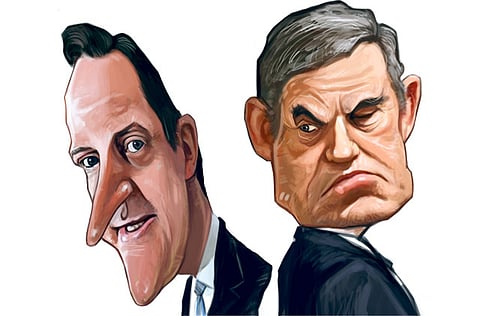An election driven by people not politicians
Whoever wins the next UK polls no longer has a choice: we must reform our clapped out political system urgently

For me, the most exciting moment in the last few days was the news that thousands of young people have rushed to register to vote before it was too late. Thousands of young people who otherwise would have been disenfranchised have asserted their right to be heard, asserted their right to shape their futures. The frustration and boredom at the stale old choices have given way to an enthusiasm and excitement that this time things could be different.
An election campaign that was poised to become a sterile trench battle between Labour and Conservative campaign managers has instead turned into something more inspiring: an election driven by people, not politicians.
But if this turn of events appears sudden, the reasons stretch back years. The cracks in the duopoly of British politics have been growing over a long period of time. Back in the 1950s, rigid two-choice politics was complete. In the 1951 general election only 2 per cent of voters voted for anyone other than Labour and Conservative. It was a world of two halves: communism versus capitalism; north versus south; left versus right; working class versus the wealthy; trade unions versus employers; Labour versus Conservative.
As Britain has hurtled into the 21st century, the political establishment remains beached in the last. The expenses scandal was more than a series of revelations about personal greed — it was an exposure of a political class stuck in a culture of deference, a political class caught living in a parallel universe spectacularly out of touch with the modern Britain it was supposed to represent.
Mass abstention
No wonder, then, that an increasing number of people turned their backs on their politicians. At the last two elections, more people didn't vote at all than voted for the winning party. Mass abstention was a logical response to a political system in crisis. The legitimacy of governments steadily weakened as Labour and Conservatives competed for a diminishing number of swing votes in swing seats, ignoring everyone else. At the last general election fewer than one in four eligible voters actually voted for the Labour government.
Up and down the country the old patterns simply broke down. Perhaps the most dramatic expression of this has been the transformation of urban Britain from Labour to the Liberal Democrats. City after city, previously synonymous with the old Labour party, turned instead to the Liberal Democrats: Liverpool, Newcastle, Hull, Sheffield, Bristol, Edinburgh, the list goes on.
Yet at each step the Labour and Conservative parties continued as if nothing had changed. Both refused to examine an electoral system designed to perpetuate duopoly just as millions of people were demanding pluralism. At the local elections last year, almost 40 per cent of people voted for parties other than Labour and the Conservatives. At the last general election, 6 million people voted for the Liberal Democrats, more than any liberal party in Europe at the time. Yet still the Labour and Conservative parties insisted that nothing needed to change. And in the most spectacular rejection of public opinion of recent times, both parties grimly decided to proceed with an unjustified war in Iraq even as the country was in a state of near revolt.
Something had to give. A political system so out of step with the country it is supposed to serve cannot last for long, and it now feels like its time is truly up. Whatever happens in the remainder of this campaign, the clock can't be turned back. Whoever wins the next election no longer has a choice: we must reform our clapped out political system urgently, or it will simply wither on the vine.
There is a big choice for progressives of all parties: do we seek to maintain and conserve an old order on its last legs? Or do we seek to shape the future by delivering real change, real reform for good? I believe there is now a unique opportunity for progressives to rally round a new agenda for change: political reform; fair taxes; social mobility; sustainable economic growth. This is not a pick-and-choose menu of reform. It is a template for change. Progress in one area does not make sense without progress in another. Delivering fairer and lower taxes to millions of families who are struggling to make ends meet only makes sense if we deliver the best education, with smaller class sizes and more one-to-one tuition, to children who need the most help.
Devolving our hopelessly overcentralised political system only makes sense if we decentralise our economy, too, so that it is never again taken hostage by a small clique of irresponsible financiers in the City at the cost of the rest of the country.
Labour and the Conservatives have pledged to put Liberal Democrat policy under the microscope — I welcome that scrutiny. And I look forward to another chance to make the case for real change. For we face a once-in-a-generation opportunity for lasting fairness and fundamental reform. Ask yourself: who do you trust to make that really happen? Labour seems to have given up trying. The Conservatives offer merely the illusion of change. We have to do something different this time, and the only party that is different is the Liberal Democrats. If you share my ambition, join us.


